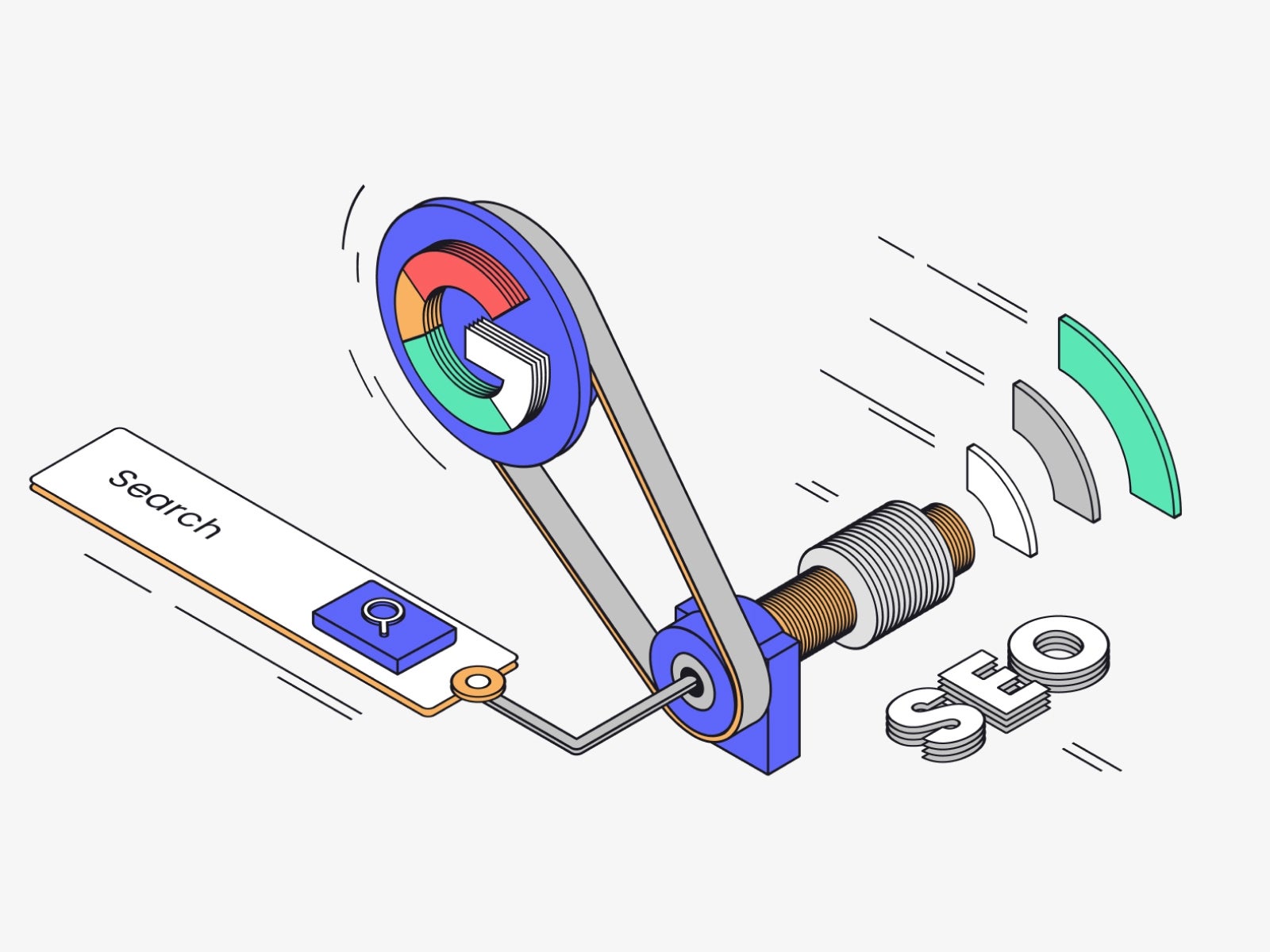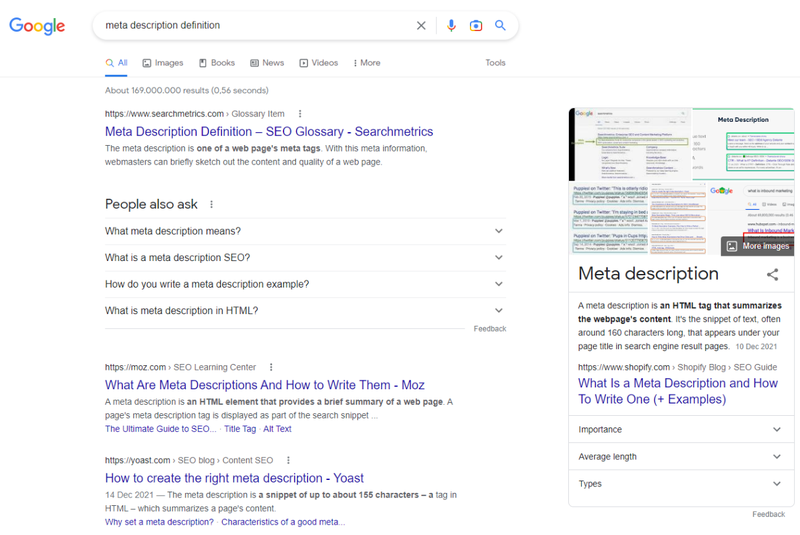
– In-House vs. SEO Company
According to Google’s guidelines “a page's meta description tag gives Google and other search engines a summary of what the page is about.” They also help users decide if they want to click on a website in a search result. Writing meta tags is a job that you can do in-house as long as you know what to do and where to start. When writing meta descriptions, the goal is to summarize the content of your page in short snippets that persuade people to click on the title and visit the page. When done correctly, this will help to drive traffic to your website.
What works for your company, doesn't necessarily work for another organization. While some companies have the in-house capabilities to manage their meta descriptions, others consider if instead they might need an SEO company to help them. You can read more about that later in this article.
– What Is a Website Meta Description?
A meta description is a brief summary of a web page that can be found on search engine result pages (SERPs.) For example, when you search for ‘meta description definition’ on a search engine like Google or Bing, the results that are displayed on the SERP will include different web pages that all include the definition of a meta description.
It works the same when searching for longer key phrases, for example ‘nearshore software development services costa rica’ as shown in the image below. Generally, the top of the search results will show paid ads, followed by additional results known as organic results.
Each result consists of a URL, meta title, and a meta description which is a snippet of the page’s content. The user can determine which result looks most relevant to them and click on the meta title to read the full webpage.
Search engines use different ways to determine relevance, but they all rely on keywords. If you want people to click through when they see your link, you need to include relevant keywords in your meta titles and descriptions.

– Are Meta Descriptions Important for SEO
Yes, meta descriptions are important. Meta tags aren't as important for SEO as they once were, but the importance of meta descriptions in SEO is still there. They help visitors to decide whether a web page is relevant for them or not, and they help search engines understand what a page is about. A well-written meta description that is relevant and optimized has the power to raise the CTR of your organic search results. More users who see your web page highlighted in the search results pages will click on your title and land on your web page. This will positively affect your webpage’s ranking, which could mean more traffic.
– How Long Should a Meta Description Be?
You shouldn't worry too much about choosing an exact number of words for your meta description, there isn't an exact "right" length for any piece of copywriting. It is important to keep in mind that in theory, Google will only display up to 160 characters. Since the pixels are also important, you could have less than 160 characters and still get your meta description cut out.
Generally speaking, the ideal meta description length for 2023 should be between 120-155 characters. You should be able to fit most pieces of text into between that length.
If you want to make sure that you have the right meta description size, you can use the meta description length checker. This tool calculates not only the characters but also the pixels of your description. You will be able to see what your meta description looks like on Google.
– Can Meta Description Be the Same as Content?
Yes, it can be the same thing. If you don't create a meta title or description, Google will use some parts of your site's content to create a meta title and description for you. However, it is recommended that you write your meta descriptions, or have a marketing agency do it for you. Meta descriptions offer a big opportunity to engage with potential visitors, and possibly new customers. By including keywords, call-to-actions, and relevant information in your meta descriptions, you can persuade web users to click your links rather than those of your competitors.
– How Many Keywords Should You Include in the Meta Description?
The best use of keywords in a meta description is to include the targeted keywords in a natural, non-spammy way that makes the reader want to read the content. Google and other search engine spiders often highlight keywords from the search query in the description box, so try to match your descriptions to important keyword phrases as closely as possible.
For the same reason that you use keywords in your content for better SEO, you want to incorporate key phrases into your page description. It is an important step towards building authority, creating trust, and increasing website traffic.
However, cramming too many variations of the same keyword into a single 160-character sentence won’t do your website any good. In fact, it could have a detrimental impact on search engine rankings.
- Are Duplicate Meta Descriptions a Problem?
Yes, having duplicate meta descriptions can be harmful to your SEO and should be avoided. If two or more meta descriptions on your website are identical, they are considered to be duplicates. The consequence for having duplicate meta descriptions is that it may negatively impact your rankings and domain authority scores.
Writing meta descriptions for each page on your website is a daunting task. Especially when your website has hundreds (or even thousands!) of web pages. So, what are your choices?
There are different ways to check your website for duplicate titles and meta descriptions. One option is to do it yourself, which can be helpful if you have the time and resources available. Tools like SiteBulb and ScreamingFrog can effectively crawl your website to detect possible duplicate meta descriptions. Don't have the manpower or the time to crawl your website and improve your meta titles and descriptions? Another option is to hire someone to do it for you.
– How Do I Come Up With Meta Description Content?
The best way to write a meta description is to be straight to the point and include a call-to-action, or even a simple “click here,” to persuade users to click through to your website. The following 7 steps will help you write a great meta description.
1. Choose Your Focus Keywords
Incorporating a primary keyword or phrase within your web pages' descriptions helps to improve your visibility in organic search results. If the search term matches the texts within the meta description, Google will use it and highlight it within the SERPs which will increase the CTR. Keyword stuffing, the practice of cramming too many similar or identical keywords into a web page or meta description, is bad SEO practice and should be avoided. Instead, use keywords naturally and sparingly for SEO success.
2. Consider Your Buyer Persona
Your buyer persona is a fictional representation of your ideal customer, which helps you to better understand your target audience. The buyer persona should be based on real data, not assumptions or instinct. With your buyer persona in mind, you can start identifying the psychological triggers that will spark your target audience to take action with your business. What sort of headline will grab their attention? What meta description and call to action will lead to them visiting your web page?
3. Use an Active Voice
As mentioned, meta descriptions play two roles; they describe the page content and engage visitors through the SERPs. Meta descriptions aren't just for SEO purposes; they're meant to be engaging and interesting enough to draw attention from readers. Make sure that potential visitors know why they're stopping by and give them something to read and maybe even encourage them to click through to learn more or take further action. Using an active voice helps to make your meta description direct and interesting.
4. Include a CTA (Call-to-action)
You want to encourage people to visit your site rather than your competitor's websites. Adding CTAs to your meta tags will help to direct consumers' attention towards specific actions. CTAs can emphasize the features of products, encourage people to take advantage of offers, and increase conversions. Common CTAs include; buy now, download here, and learn more. When people click on your result, it shows Google that you're an authoritative source for the topic which can improve your ranking in the SERPs.
5. Match the URL Content
Meta descriptions help describe what a web page is about not just to search engines, but to the people viewing the information in the SERPs. When a meta description doesn't reflect the content of the page, this is considered bad practice. Chances are that Google will not use your meta description and it might even hurt your ranking. When writing a meta description, try to summarize a page's content and encourage people to read the full page.
6. Be Unique
For every web page, you should create unique meta descriptions to ensure that users can easily find what they're searching for. If duplicate meta descriptions appear on multiple URLs of a website, it usually means that either the site owners were lazy or they cut corners. Sometimes meta descriptions are automatically generated by a content management system (CMS) or plugin and then overlooked, ignored, or disregarded. If you use a WordPress plugin that makes recommendations for optimizing these descriptions, check out those recommendations.
7. Keep The Right Length
When it comes to the length, you don't want to be too brief. Search engines will likely view shorter meta descriptions as not having enough content for them to be useful. On the other hand, if you make them too long, Google will cut them off and users will not see the entire text. To make sure that meta titles and descriptions will be visible and of the right length, you can use a meta description length checker to help you to stay within the character and pixel limitation.
- Examples of Meta Description for SEO
The following images are examples of meta descriptions as seen on search engine results pages.
For example, when searching for “tennis shoes”, the first organic search result shows a web page of Tennis Point, a company that specializes in selling tennis and running equipment. In their meta description, they invite users to explore their shoe selection and find their ideal tennis shoes now by clicking the link―a clear CTA.

When searching for “all-inclusive,” one of the first search results on Google includes a blog about the 14 best all-inclusive resorts in the United States. This blog is published by Travel + Leisure, a travel media brand whose mission is to inform and inspire passionate travelers. Although their meta description is missing a clear call to action, asking readers a question may evoke their curiosity and hold their attention.

The meta description of Planet Fitness shows a lot of information about what customers can expect when joining this gym. The call to action ‘Join now!’ encourages the reader to take immediate action. By clicking on the link, they will be able to sign up and enjoy the aforementioned benefits.

- Conclusion
A meta description is a summary of a web page, that is displayed below the meta title and URL in search engine results. Meta descriptions help users decide whether or not a web page is relevant to them and help search engines understand the content of a page when indexing. When done right, your web pages will rank higher on search engine results pages and attract more traffic to your site. Meta descriptions are too important to be ignored or neglected.
When writing meta descriptions, you need to choose your focus keywords, consider your buyer persona, use an active voice, include a CTA, match the content, be unique, and keep the right length. If you're not sure how to find relevant keywords for your web pages, lack the manpower to crawl your website, or need advice on writing persuading and engaging meta descriptions, consider hiring an SEO services company or digital marketing agency.
With professional help, your website can generate traffic and leads for you while you’re able to stay focused on your core business.
About Pixel506
Pixel506 is a full-service digital marketing agency with a team of professional content writers, SEO specialists, and other marketing professionals. Since 2009, we have helped numerous businesses succeed online. We conduct SEO audits, optimize and manage websites, and provide our clients with extensive, in-depth reports. Our on-site SEO services make it easier for search engine robots to understand your web pages and drive traffic to your website. Whether you could use some professional help to get you started with your website, keywords, or meta titles and descriptions, or to optimize your existing strategy, we are here to serve you. Contact us today for more information.
